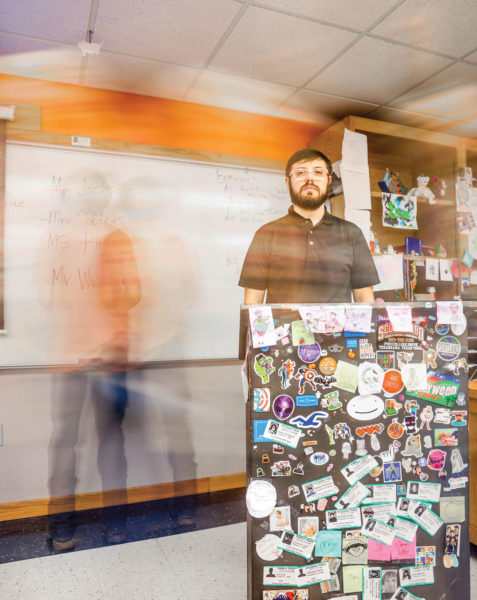UPDATED
The classroom chatter fills a mind already consumed by ungraded papers and unruly students. With a thousand unchecked to-do’s, the thought of leaving the profession behind weighs heavy on their mind. Each day the prospect is entertained a bit more until, finally, they give in and wonder why they didn’t do it sooner.
Teacher turnover shows as the rate at which teachers and other school personnel leave their jobs, causing multiple openings with only a few people willing to fill them. Over the past several years, the nation, in general, has seen a large increase in turnover rates, with our school mirroring this increase.
“Nationally and in the state of Texas, there is a teacher shortage,” Texarkana Independent School District superintendent Doug Brubaker said. “A higher turnover rate creates more vacancies that need to be filled. Timelines can be tight for filling positions, particularly those in high need areas, over the summer.”
With several reasons contributing to teachers leaving the profession, stress and the demands of the job play major roles. A teacher’s job isn’t only to teach; they also have to be responsible for the students.
“It’s a very demanding job and a very emotional job,” math teacher Rhonda Johnson said. “When you see kids suffer, you want to help them, but you can’t help them with stuff outside the classroom along with what’s in the classroom. It’s extremely, extremely challenging. And if you don’t have that calling, you don’t stay in it long.”
Beyond students, teachers also deal with scrutiny from parents and the public.
“This mindset and the increase in the amount of helicopter parents wears teachers down,” science department chair Jessica Sharp said. “It is no longer dedication to our craft and educating students, it is parent contacts and paperwork that take the bulk of our time and effort. This makes those teachers that are already struggling with low pay and lack of respect for their profession less likely to stick it out. They do not see the benefit in staying.”
In some cases, teachers never initially had a passion for teaching; they just got a degree because of the high demand. When they realize the baggage of the job, many decide to switch careers.
“I do think a lot of people end up teaching when they’re never meant to teach. They need teachers who have the right degree, so they try it. But they’re not made for it,” Johnson said. “It’s easy to get a teaching degree but not have the love for the job. And they don’t know it till they’re in that position and realize that it’s a lot of work. They’re not meant to be there, but we need people there. So they kind of get where they don’t belong, and then they hate their job.”
When there is a constant need for teachers but no one to fill the positions, more stress is put on the existing teachers. Fewer teachers to carry out classes mean that the existing teachers’ classrooms will sometimes be filled to capacity, making the learning environment less effective.
“If they can’t find somebody to replace [the teacher that left], then your class sizes go up,” Johnson said. “When our class sizes go up, it’s hard to keep control of the classroom. They’re distracted, and it’s very hard physically for the teacher to keep them under control when you have large class sizes.”
On the other side of the spectrum, the influx of new teachers leads to many new faces on campus for students and long-standing teachers alike. This unfamiliarity can lead to confusion or misunderstandings.
“I see people all the time that I have no clue about who they are. I don’t know what they teach,” Johnson said. “Students will say, ‘Can I go to so-and-so’s class?’ and I’m like, ‘Who’s that? I don’t even know who they are.’ So it is very weird to work with people that you don’t know.”
Because of the emotional baggage that comes with the job, it’s important for teachers to have people that they can rely on and relate to. If a teacher is able to talk and see they’re not alone, some weight can be lifted off their chest. Otherwise, teachers would have an even harder time in the profession.
“You have to have a group of people for support. One teacher can’t just do it by themselves,” Johnson said. “They need peers that they can talk to and just go in there at the end of the day and say, ‘Oh my gosh, I’ve had a horrible day’ and just feel safe to come in there and vent. If they don’t have that relationship with other teachers, you have some issues.”
With teachers leaving consistently, schools have struggled. Education agencies take the initiative to solve this dilemma. Texas, in particular, has implemented programs such as the Teacher Vacancy Task to investigate the causes of the shortage and resolve issues.
“We know that there are fewer people going into education in recent years,” Brubaker said. “The governor established a Teacher Vacancy Task Force to develop recommendations that could be implemented to help recruit and retain teachers.”

Tacking on to broader initiatives, TISD created multiple programs in battle with the turnover. With clubs such as Teach TISD and partnerships with local colleges, the district hopes that there will be an influx and retention of teachers in the coming years.
“We also need to increase the number of students who prepare for teaching careers. Through Teach TISD, we are helping students as young as first grade begin to explore careers in education. We also have a new Pathways in Technology Early College High School (P-TECH) program in partnership with Texarkana College through which students earn Associate’s Degrees in education and training,” Brubaker said. “Following graduation from high school, we can hire them as instructional aides in our district while they complete the last two years of their education degrees at Texas A&M – Texarkana.”
With Teach TISD, students gain first-hand experience while working with kids, allowing them to learn the skills necessary to be an educator. With the turnover, some students with aspirations of becoming a teacher have become worried about their future but nonetheless strive forward.
“[In Teach TISD] we volunteer to help teachers if they have a field day at elementary schools. In the spring, we went to a state conference where we just learned more teaching skills,” senior Taybri Johnson said. “[I’ve had some doubts about going into the teaching profession with the turnover] because I know some teachers who love teaching, but they just can’t do it anymore, and I really don’t want that to happen to me. I’m just hoping and praying that it doesn’t happen and that I still want to be a teacher.”
According to Texas High School principal Ben Renner, 28 teachers left at the end of the 2022-2023 school year, or 18% of the staff. Of those 28 open positions, 27 were filled for this school year. Renner is focusing on the retention of teachers this school year rather than having to hire new educators. He hopes that through an open door policy, face-to-face meetings with groups of four to six teachers, the Renner Listening Tour, and his plan to talk to teachers one-on-one, he can create a positive, nurturing and supportive environment.
“If you want to talk to me, I’ll get it in the books,” Renner said. “I think listening [to teachers], trying to support them, giving them a voice in the things that we do as a campus and then trying to be present out there [will help with the retention of teachers].”







